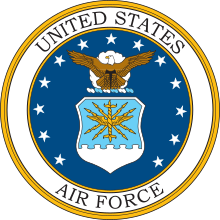389th Fighter Squadron
The 389th Fighter Squadron is part of the 366th Fighter Wing at Mountain Home Air Force Base, Idaho. It operates McDonnell Douglas F-15E Strike Eagle aircraft conducting close air support.
389th Fighter Squadron
 | |
|---|---|
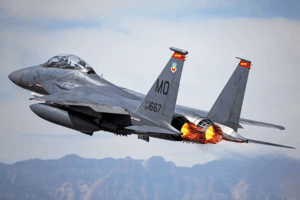 389th Squadron F-15E | |
| Active | 1943–1946; 1953–1959; 1962–1991; 1992–present |
| Country | |
| Branch | |
| Role | Fighter |
| Part of | Air Combat Command |
| Garrison/HQ | Mountain Home Air Force Base |
| Nickname(s) | Thunderbolts |
| Engagements | European Theater of Operations Vietnam War Global War on Terror[1] |
| Decorations | Distinguished Unit Citation Presidential Unit Citation Air Force Outstanding Unit Award with Combat "V" Device Air Force Outstanding Unit Award Belgian Fourragère Republic of Vietnam Gallantry Cross with Palm[1] |
| Insignia | |
| 389th Fighter Squadron emblem (approved 15 September 1993)[1] | 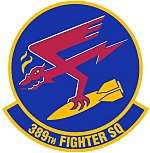 |
| Original 389th Fighter Squadron emblem (approved 13 February 1945)[2] | 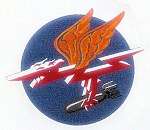 |
Mission
Perform close air support, interdiction, strategic attack, suppression of enemy air defense, and defensive counterair missions, employing the full array of U.S. Air Force capabilities including precision-guided munitions, inertially-aided munitions, night vision goggles, fighter data link 366 OG Fact Sheet
History
World War II
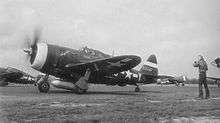
The 389th flew combat in the European Theater of Operations from 14 March 1943 to 3 May 1945.[1]
Lt. Col. John B. England, who was commander of the 389th Fighter-Bomber Squadron from Alexandria AFB, was killed when his F-86 crashed into the woods near Toul. He was returning from gunnery practice near Tripoli, Libya. The fog was very thick and visibility was near zero. After several attempts to locate the runway his plane suffered fuel starvation. At this moment he sighted a portion of the runway and was in a glide with a high probability of a successful landing. But his glide path took him over the barracks where his men were housed. He calmly stated on the radio that this was not an acceptable risk. He turned and crashed into a wooded area outside the base perimeter. In his honor, Alexandria AFB was renamed England Air Force Base, and retained that name until its closure in 1993.
Tactical Air Command
Vietnam War

The squadron flew combat operations in Southeast Asia from 14 March 1966 to 8 October 1971.[1]
Recent operations
The squadron trained F-111 Aardvark aircrews from 30 September 1979 to 26 June 1991. It rotated aircraft and personnel to Southwest Asia throughout the 1990s in support of Operation Southern Watch. It furnished resources for units participating in Operation Enduring Freedom and Operation Noble Eagle following the 11 September 2001 terrorist attacks on the United States. Pilots and aircraft deployed from unit conducted close air support mission after 2005, although the unit itself remained in the United States.[1]
Lineage
- Constituted as the 389th Fighter Squadron (Single-Engine) on 24 May 1943
- Activated on 1 June 1943
- Redesignated 389th Fighter Squadron, Single-Engine on 20 August 1943
- Inactivated on 20 August 1946
- Redesignated 389th Fighter-Bomber Squadron on 15 August 1952
- Activated on 1 January 1953
- Redesignated 389th Tactical Fighter Squadron 1 July 1958
- Inactivated on 1 April 1959
- Activated on 30 April 1962 (not organized)
- Organized on 8 May 1962
- Redesignated 389th Tactical Fighter Training Squadron on 30 September 1979
- Inactivated on 22 July 1991
- Redesignated 389th Fighter Squadron on 1 March 1992
- Activated on 11 March 1992[1]
Assignments
- 366th Fighter Group, 1 June 1943 – 20 August 1946
- 366th Fighter-Bomber Group, 1 January 1953 (attached to Twelfth Air Force 29 September–17 November 1954, 48th Fighter-Bomber Wing 18 November 1954 – 28 March 1955, United States Air Forces in Europe c. 20 September-c. 3 October 1956, 21st Fighter-Bomber Wing after 10 June 1957)
- 366th Fighter-Bomber Wing (later 366th Tactical Fighter Wing), 25 September 1957 – 1 April 1959 (remained attached to 21 Fighter-Bomber Wing to c. Oct 1957, attached to 388th Fighter-Bomber Wing, c. Oct-9 Dec 1957, 49th Fighter-Bomber Wing 10–22 December 1957)
- United States Air Forces in Europe, 30 April 1962 (not organized)
- 366th Tactical Fighter Wing, 8 May 1962 (attached to Alaskan Air Command, 15 September–16 December 1965)
- 37th Tactical Fighter Wing, 15 June 1969
- 12th Tactical Fighter Wing, 31 March 1970
- 347th Tactical Fighter Wing, 15 October 1971
- 366th Tactical Fighter Wing, 31 October 1972 – 22 July 1991
- 366th Operations Group, 11 March 1992 – present[1]
Stations
|
|
Aircraft
- Republic P-47 Thunderbolt (1943–1946)
- North American P-51 Mustang (1953)
- North American F-86 Sabre (1953–1955)
- Republic F-84 Thunderjet (1955–1958, 1962–1965)
- North American F-100 Super Sabre (1958, 1963)
- McDonnell F-4 Phantom II (1965–1971)
- General Dynamics F-111 AardvarkF then A model (1971–1991)
- General Dynamics F-16 Fighting Falcon (1992–2007)
- McDonnell Douglas F-15E Strike Eagle (2007–present)[1]
References
Notes
- Aircraft is Republic P-47D-15-RE Thunderbolt serial 42-76347 nicknamed "Jenny Rebel"
- Aircraft is McDonnell F-4D-33-MC Phantom II serial 66-8820.
Citations
- Dollman, TSG David (4 October 2016). "Factsheet 389 Fighter Squadron (ACC)". Air Force Historical Research Agency. Retrieved 20 July 2017.
- Maurer, Combat Squadrons, pp. 477–478
- Station number in Anderson.
- Station number in Johnson.
Bibliography
- Anderson, Capt. Barry (1985). Army Air Forces Stations: A Guide to the Stations Where U.S. Army Air Forces Personnel Served in the United Kingdom During World War II (PDF). Maxwell AFB, AL yes: Research Division, USAF Historical Research Center. Archived from the original (PDF) on 23 January 2016. Retrieved 28 June 2017.
- Johnson, 1st Lt. David C. (1988). U.S. Army Air Forces Continental Airfields (ETO) D-Day to V-E Day (PDF). Maxwell AFB, AL: Research Division, USAF Historical Research Center. Archived from the original (PDF) on 29 September 2015. Retrieved 26 June 2017.
- Maurer, Maurer, ed. (1983) [1961]. Air Force Combat Units of World War II (PDF) (reprint ed.). Washington, DC: Office of Air Force History. ISBN 0-912799-02-1. LCCN 61060979. Retrieved 17 December 2016.
- Maurer, Maurer, ed. (1982) [1969]. Combat Squadrons of the Air Force, World War II (PDF) (reprint ed.). Washington, DC: Office of Air Force History. ISBN 0-405-12194-6. LCCN 70605402. OCLC 72556. Retrieved 17 December 2016.
- Ravenstein, Charles A. (1984). Air Force Combat Wings, Lineage & Honors Histories 1947–1977. Washington, DC: Office of Air Force History. ISBN 0-912799-12-9. Retrieved 17 December 2016.
